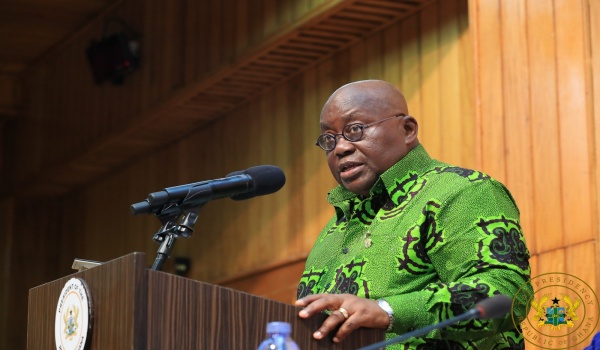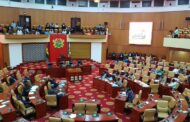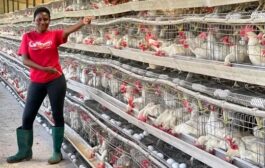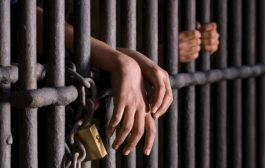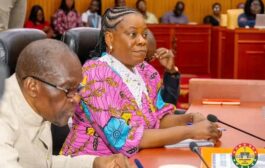I am embarking on a nine-day official working visit to France, Belgium and South Africa, as part of efforts being made to ensure our nation’s rapid and sustained post-Covid economic recovery, and have pre-recorded this update, prior to leaving the country.
I must, at the outset, express the gratitude of the nation to the National Chief Imam, Sheikh Osman Nuhu Sharubutu, and all Muslims across the country, for adhering to the request to have a subdued Eid ul-Fitr celebration, devoid of large public gatherings.
By and large, it is gratifying to note that many Ghanaians are adhering to the protocols, and it is heartening to see law enforcement agencies acting against persons and institutions flouting the regulations.
Until we vaccinate the requisite numbers of Ghanaians, and achieve herd immunity, which will help return our lives to normalcy, the Imposition of Restrictions Act, 2020 (Act 1012), will remain in force, and the security agencies will not relent in their efforts to enforce it.
We have seen a marked reduction in active cases, i.e., persons who currently have the virus, from five thousand, four hundred and forty-four (5,444) persons as at 26th February, to one thousand, three hundred and fourteen (1,314), as at 11th May.
Our rate of infection has dropped significantly from four hundred (400) a day when I last spoke to you to less than one hundred (100) now, and the number of persons who have recovered from the virus has also increased from seventy-seven thousand, nine hundred and seventy-two (77,972) to ninety-one thousand, one hundred and forty-six (91,146) within the same period.
One hundred and seventy-six (176) more persons, in that time, have also, unfortunately, lost their lives to COVID-19. Cumulatively, we have conducted one million, one hundred and twenty-one thousand, one hundred and sixty-eight (1,121,168) COVID tests.
Since I announced the arrival of the first batch of AstraZeneca vaccines from the COVAX facility, together with the procurement and receipt of others, we have rolled out two phases of our vaccination plan.
The first phase involved vaccinating a segment of the population in forty-three (43) districts, i.e., health workers, persons with co-morbidities, persons above the age of sixty (60), physically challenged persons, journalists, frontline security personnel, and a cross section of persons in the three arms of government.
The second phase involved vaccinating all other health workers across the country. Nearly a million people have now received the first dose of the vaccine.
International vaccine politics and the unpredictability of the supply chain, as well as a third wave of infections in some countries in Europe and Asia, have meant that we have not been able to secure as many vaccines and vaccinated as many Ghanaians as we would have wanted at this stage. In spite of these obstacles, the target is to vaccinate some twenty million Ghanaians, i.e., the entire adult population of Ghana, by the end of the year.
In the past few days, Government has, through COVAX, received an additional three hundred and fifty-thousand (350,000) doses of AstraZeneca vaccines. These will be added to existing stock to provide the second jab for the three hundred and sixty-thousand (360,000) persons, in the forty-three districts in the Greater Accra, Ashanti and Central Regions, who received their first jabs from 1st to 9th March.
I am happy to announce that, beginning Wednesday, 19th May, to Wednesday, 26th May, the deployment of the second dose of vaccines will take place across the designated vaccination centres in the forty-three (43) districts, approximately twelve (12) weeks after the first jab, as the science prescribes. More details of the deployment will be communicated by the Ghana Health Service in the coming week.
Efforts are being made to ensure that those who received their first jabs after the 9th of March will, in due course, receive their second.
We are expecting an additional three hundred thousand (300,000) doses of Sputnik V vaccines, which have already been approved by the Food & Drugs Authority, to arrive in the country. As and when we make further progress in the acquisition of vaccines, the Ministries of Health and Information will make this known to you. We are making all efforts to achieve our overall vaccination target.
I want to reiterate, as captured in the travel directive jointly issued by the Ministry of Foreign Affairs and Regional Integration and the Ghana Health Service, that all non-essential trips to countries with high COVID-19 infection rates should either be cancelled or postponed. There will be plenty of time, God-willing, for such trips in the future. We will continue to review our travel restriction measures.
To prevent fake COVID-19 PCR certificates being used to enter our country, Government, through the Ministry of Health, has begun the process of digitising PCR test results to ensure ease of verification. The technology platform being used at KIA is based on standards set by the Africa Trust Travel and ECOWAS Biomars. All travellers arriving in Ghana must have test results or certificates bearing the trusted travel or biomars codes to be acceptable at KIA.
We have re-evaluated quality checks on testing at KIA, and we are satisfied with the sensitivity and specificity of the testing regime there. All arriving passengers who test positive will follow the laid down procedure. Those who test negative from designated COVID-19 hotspots, and testing negative at KIA, may be subjected to a repeat test on the third day of arrival.
Our fight against the virus, my fellow Ghanaians, is by no means over. The continuous havoc being experienced by some countries, as a result of the virus, is a testament to the fact that, until all countries have rid themselves of the virus, and have achieved herd immunity, none is safe.
So, let us all continue to adhere to the COVID-19 safety protocols that are now part of our day-to-day activities. We see the rewards for our compliance with the protocols, whenever we witness favourable scenarios in our fight against the virus, evidenced in the easing of some of the restrictions.
I am particularly happy that the significant investments we have made in ensuring compliance with the safety protocols have enabled us to open, in safety, all schools, private and public, at all levels, and I want to thank parents, teachers and students for making them work.
We have also put in place the necessary protocols that have allowed us to return to churches, mosques, workplaces, markets, stadia, and to travel. Our ability, however, to congregate in closed spaces, like cinemas, theatres and nightclubs, remains restricted.
In a move towards the reopening of cinemas and theatres, Government has engaged cinema owners and operators on a set of protocols and guidelines that need to be put in place and implemented by all operators before eventual re-opening. In the coming weeks, the Ghana Health Service and the Ghana Tourism Authority will be announcing these protocols and mandatory modalities, and work with the operators on a set of directives that will ensure the health and safety of all patrons and staff in all the facilities involved.
I remain optimistic that we can return our lives to normal if we co-operate and work together. Let the reduced rate of infections not lull us into a false sense of security; let us continue to adhere to the safety protocols, i.e., the enhanced hygiene and mask wearing protocols; let us take the vaccine when it gets to our turn; and let us continue to put our faith in Almighty God.
There is light at the end of the tunnel, our goal of zero active cases is in sight if we remain vigilant and steadfast.
Source: Mybrytfmonline.com



